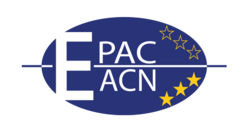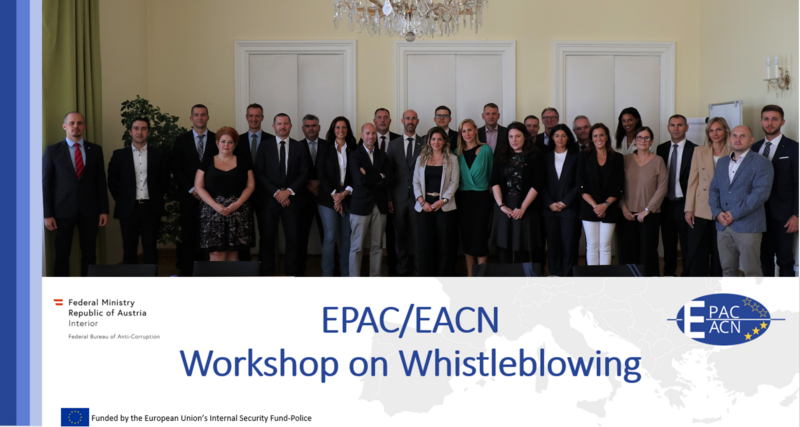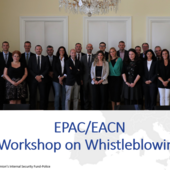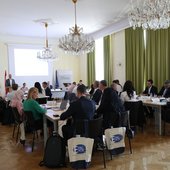Members of the European Partners against Corruption (EPAC) and the European contact-point network against corruption (EACN) convened for a workshop dedicated to the topic of whistleblowing. The workshop took place in Vienna, Austria, and was hosted by the Austrian Federal Bureau of Anti-Corruption (Bundesamt zur Korruptionsprävention und Korruptionsbekämpfung - BAK). With 25 participants and five experts from 12 countries and 19 anti-corruption agencies and police oversight bodies, the event spanned a day and a half, filled with intense discussion, knowledge sharing and collaboration.
Day 1 - Thursday, 28 September 2023
The event commenced with the arrival and registration of participants at the Federal Bureau of Anti-Corruption in Vienna. Ernst Schmid, Vice-President (Anti-Corruption Strand) and Head of Department at the BAK, then welcomed all participants and speakers and comprehensively guided through the agenda. Laura Valli, Board Member of the Italian National Anticorruption Authority (ANAC) and Chair of the Network of European Integrity and Whistleblowing Authorities (NEIWA), set the stage for the workshop by presenting the significance of the EU Whistleblowing Directive and its main aspects, while also examining the challenges related to its transposition from an external channels' perspective. A key highlight of this session was the discussion on the pivotal role NEIWA plays in the transposition process and its future impact.
During the "Tour de table" session all participants introduced themselves and their organizations. This included a discussion of the various reporting offices and their organizational structures, enabling attendees to better understand the challenges and opportunities of each organization in this field.
Luca Mak, Executive Director of Transparency International (Austrian Chapter), then delved into the dimensions of whistleblowing and provided an overview of the whistleblowing landscape across key regions. Societal aspects, including media and policy-making, were explored, along with recent key rulings like the ECHR on "Lux Leaks" and the impact they might have on national legislation. The session concluded with a group discussion.
In the afternoon, participants engaged in a working session focused on the relationship between the private sector and reporting offices, which was guided by Louise-Marie Petrovic, Legal Expert and Representative of the EPAC/EACN Secretariat (Vienna branch). This session included a discussion of a fictitious case and addressed the challenges of communicating with the private sector, offering innovative solutions.
The day concluded with a final working session, which this time examined the relationship between the public sector and reporting offices. Monika Kalinauskienė, Assistant Chief Prosecutor of the Internal Investigations Division of the General Prosecutor's Office of the Republic of Lithuania, led the discussion and emphasized the synergy between the public sector and reporting offices. Topics included the establishment of internal reporting channels, cooperative efforts in conducting investigations, external oversight, communication, public awareness, and a fruitful group discussion on best practices and lessons learned.
Day 2 - Friday, 29 September 2023
The second day of the workshop began with a working session led by Fiona Springer, Senior Expert Whistleblowing at the Austrian Financial Market Authority (FMA) and Member of Transparency International (Austrian Chapter). This session included a presentation on the FMA's Whistleblowing Learning Journey, implementing reporting channels, building trust, and practical insights. The day's discussions were punctuated by a group discussion to collect best practices and lessons learned.
In the final session, "Whistleblowing – quo vadis?" chaired by Martin Kreutner, Dean Emeritus of the International Anti-Corruption Academy (IACA), former Special Advisor at the Ministry of the Interior and Director of the Federal Bureau for Internal Affairs, Austria and EPAC/EACN Honorary Member, attendees explored the origin and development of democracies, whistleblowing, and human rights. Possible developments of whistleblowing were also discussed with input from all participants.
Overall, the workshop brought together experts and practitioners from EPAC/EACN member organizations to tackle the complex issue of operating internal and external reporting offices and to promote the vital role of whistleblowing in combating corruption and enhancing transparency. Thanks to the dedication of all participants and speakers who shared their expertise, insights and perspectives, this workshop was a great success for all organizations involved. The core elements and findings of the workshop will be presented in a publication (prepared by Lukas Krupitsch, University Assistant and Lecturer at Vienna University of Economics and Business; Legal Associate (White Collar Crime and Criminal Law on Corruption).
A heartfelt thank you to all who participated in this workshop.
Funded from the European Union's Internal Security Fund-Police



